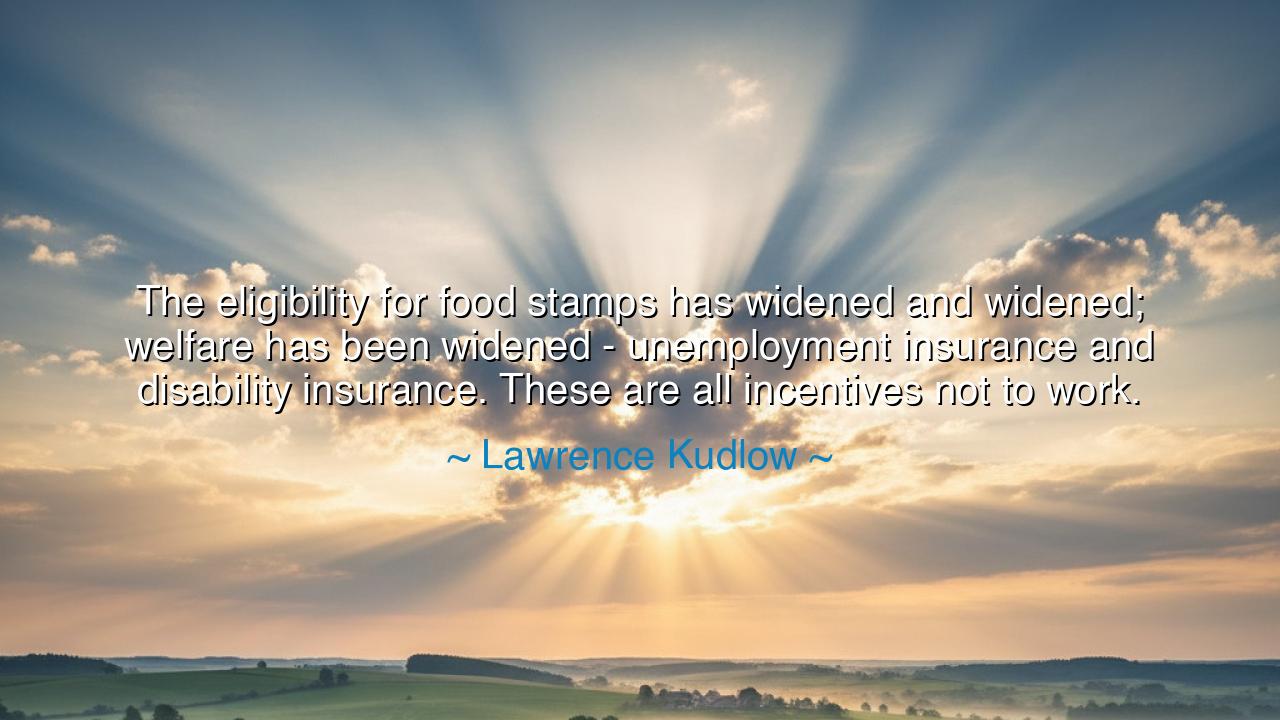
The eligibility for food stamps has widened and widened; welfare
The eligibility for food stamps has widened and widened; welfare has been widened - unemployment insurance and disability insurance. These are all incentives not to work.






Host: The soft glow of the evening light filled the room, casting long shadows on the walls as Jack sat back in his chair, the weight of the conversation beginning to settle around them. Jeeny, sitting across from him, glanced up from her notebook, her expression thoughtful. There was a quiet anticipation in the air, as if the next words spoken would carry with them a deeper meaning.
Jeeny: (gently) “Lawrence Kudlow once said, ‘The eligibility for food stamps has widened and widened; welfare has been widened — unemployment insurance and disability insurance. These are all incentives not to work.’”
Jack: (pauses, reflecting) “That’s a bold statement. It’s interesting how he frames welfare programs, food stamps, and unemployment benefits as something that deters work rather than supports it. But it’s also a complex issue, right? Because there’s so much more to the story.”
Jeeny: “Exactly. At the surface, it might seem like these programs create a safety net, but Kudlow’s argument seems to suggest that the more accessible these programs become, the less incentive there is for individuals to find work or strive for self-sufficiency.”
Jack: “But the problem with that perspective is that it overlooks the real challenges people face. These programs are meant to provide a safety net for people in tough situations, but there’s a fine line between offering temporary help and making these systems a permanent crutch.”
Host: The quiet rustling of papers seemed to underline the tension in the conversation. They weren’t just discussing policy; they were grappling with the balance between support and dependency, between offering help and inadvertently discouraging progress.
Jeeny: “I think it’s true that there needs to be a balance between offering help and encouraging self-sufficiency. But the challenge is understanding the underlying reasons why people rely on these systems. Sometimes, it’s not about laziness or a lack of motivation, but rather systemic barriers like lack of access to good education, job opportunities, or healthcare.”
Jack: “Right. And while I understand Kudlow’s point about incentives, it’s not a one-size-fits-all solution. Just making welfare programs harder to access isn’t going to automatically lead to more people going back to work. For some, it could just make the situation even worse, leaving people without the support they need.”
Jeeny: (nodding) “There’s also the question of living wages. If people can’t earn enough to support themselves and their families through work, then these programs are often the only way they can survive. We can’t just assume that eliminating or restricting these benefits will automatically force people to work more effectively.”
Host: The stillness in the room seemed to echo the complexity of the issue. The balance between self-reliance and support, between encouragement and dependence, was a difficult one to strike. The conversation was about much more than just policy — it was about the deeper human realities behind these systems.
Jack: “What gets overlooked in conversations like this is that these programs don’t exist in a vacuum. People don’t just go on welfare or food stamps for fun. There are usually serious circumstances that lead to that decision, whether it’s job loss, illness, or other difficult factors. It’s not about people choosing not to work; it’s about a lack of options.”
Jeeny: “Exactly. And I think the conversation needs to shift from simply discussing the cost of these programs to talking about how we can create a society where fewer people need to rely on them. It’s about creating opportunities, not just restricting access to safety nets.”
Jack: “Yes, it’s about long-term solutions. If we focus only on limiting benefits without addressing the root causes of why people rely on them, we’ll only create more problems down the line.”
Host: The soft ticking of the clock filled the silence, as the weight of their discussion settled in. The idea of incentives, whether in the form of benefits or work, wasn’t just a matter of policy. It was a matter of understanding the underlying social structures that shaped people’s decisions and actions.
Jeeny: “Ultimately, it comes down to the idea that helping people become self-sufficient requires more than just restricting support systems. It requires real investment in education, job training, and economic opportunities. That’s how we reduce dependency, by giving people the tools to succeed.”
Jack: “I think that’s the heart of the issue. Programs like food stamps and welfare are necessary safety nets, but they shouldn’t be a long-term solution. The real focus should be on empowerment, giving people the chance to build their lives in a way that doesn’t require constant reliance on external support.”
Host: The air in the room felt heavier now, as if the conversation had opened a door to deeper reflection. The issue of welfare, of food stamps and unemployment benefits, was never just about numbers or politics. It was about real people, facing real challenges, and the need for a compassionate, holistic approach to solving those problems.
And as the scene faded, Lawrence Kudlow’s words lingered —
that the balance between support and self-sufficiency
is a delicate one,
and the true challenge lies not in limiting resources,
but in creating opportunities for growth,
for empowerment,
and for lasting change.
For the path forward is not in restriction,
but in creating a system
that helps people rise,
not just survive.






AAdministratorAdministrator
Welcome, honored guests. Please leave a comment, we will respond soon